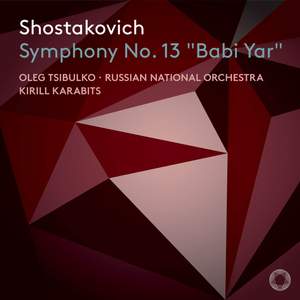Shostakovich: Symphony No. 13 'Babi Yar'
Oleg Tsibulko (bass)
Russian National Orchestra, Kirill Karabits
This beautifully engineered studio recording under Kirill Karabits has all the necessary adrenaline to keep the listener fully engaged. Karabits is particularly effective in negotiating the tricky... — More…
-
Presto Recording of the Week17th July 2020
Downloads
What are FLAC and MP3?Contents
Shostakovich: Symphony No. 13 in B flat minor, Op. 113 'Babi Yar'
Work length58:09
$15.00
$19.30
$26.25
- Oleg Tsibulko (bass)
- The Choir of the Popov Academy of Choral Art, Kozhevnikov Choir, Russian National Orchestra
- Kirill Karabits
I. Babi Yar. Adagio
Track length15:17
$4.00
$5.15
$7.00
II. Humour. Allegretto
Track length7:30
$2.00
$2.60
$3.50
III. In the Store. Adagio
Track length11:45
$3.00
$3.85
$5.25
IV. Fears. Largo
Track length11:07
$3.00
$3.85
$5.25
V. A Career. Allegretto
Track length12:30
$3.00
$3.85
$5.25






